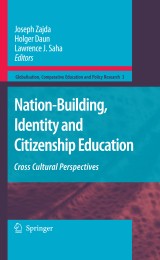Details

Nation-Building, Identity and Citizenship Education
Cross Cultural PerspectivesGlobalisation, Comparative Education and Policy Research, Band 3
|
96,29 € |
|
| Verlag: | Springer |
| Format: | |
| Veröffentl.: | 16.12.2008 |
| ISBN/EAN: | 9781402093180 |
| Sprache: | englisch |
| Anzahl Seiten: | 198 |
Dieses eBook enthält ein Wasserzeichen.
Beschreibungen
A major aim of Nation-Building, Identity and Citizenship Education: Cross-cultural Perspectives is to present a global overview of selected scholarly research on global and comparative trends in dominant discourses of identity politics, and nation-building in comparative education research. It provides an easily accessible, practical, yet scholarly source of information about the international concern in the field of nati- building, identity and citizenship education. Above all, the book offers the latest findings on discourses surrounding national identity, nation-building, and citizenship education in the global culture. It offers a timely overview of current issues affecting the formation of social identity and citizenship education in the global culture. More than ever before, there is a need to understand and analyse both the intended and the unintended effects of globalisation and the forces of globalisation on nations, organisations, communities, educational institutions and individuals around the world. This is particularly relevant to the evolving and constantly cha- ing notions of nation-states, national identity, and citizenship education globally. Current global and comparative research demonstrates a rapidly changing world where citizens are experiencing a growing sense of alienation, uncertainty, and loss of moral purpose. In this stimulating and important book, the authors focus on discourses surrou- ing three major dimensions affecting the national identity, nation-building, and ci- zenship education debate in education and society: ideology, democracy, and human rights. These are among the most critical and significant dimensions defining and contextualising the processes surrounding the nation-building and identity.
Main Trends and Issues in Identity and Citizenship Education.- Nation-Building, Identity and Citizenship Education: Introduction.- Globalisation, Nation-Building, and Cultural Identity: The Role of Intercultural Dialogue*.- Globalization, Identities, and Diversified School Education.- Democracy, Identity, and Citizenship Education in South Africa: Defining a Nation in a Postcolonial and Global Era.- Civic Education in Eastern Europe: Results from the IEA Civic Education Project.- National Identity, Multiculturalism, and Language Policies.- Globalisation, Identity, and Cultural Dynamics in a Multiethnic State: Multiculturalism in Australia.- Cultural Identity: Case Studies.- The Dialectic of Globalisation, Identity, and Local Activism: Multicultural Education Policies in Japan.- Jewish-Canadian Identity and Hebrew Language Learning: Belonging (or Not Belonging) in Montreal and Toronto.- The Transformation of Higher Education in the United Arab Emirates: Issues, Implications, and Intercultural Dimensions*.- Cultural Identity and Good Practices in Intercultural Education in Europe.- Cultural Identity and Implementing a New Language-in-Education Policy in South African Schools.- A Place of One's Own: Schooling and the Formation of Identities in Modern Nepal.
<P>This book examines issues surrounding the nation-building processes, and identity and citizenship education in the global culture, from various perspectives. Globally, there are increasing arguments both for the democratisation of education and for the use of education to promote a democratic society, based on equality, and social justice. It is argued that authentic and democratic schools could better prepare for active citizenship and for a strong civil society which are seen to be the foundation of a democratic state.</P>
<P>The book critiques the dominant discourses and debates pertaining to cultural identity, set against the current climate of growing social stratification and unequal access to quality education for all. It opens discourses related to globalisation and the state, and approaches to constructing national, ethnic and religious identities in the global culture. It explores the ambivalent and problematic relationship between the state, globalisation and the construction of cultural identity.</P>
<P>The book critiques the dominant discourses and debates pertaining to cultural identity, set against the current climate of growing social stratification and unequal access to quality education for all. It opens discourses related to globalisation and the state, and approaches to constructing national, ethnic and religious identities in the global culture. It explores the ambivalent and problematic relationship between the state, globalisation and the construction of cultural identity.</P>
Explores conceptual frameworks and methodological approaches applicable in the research of globalisation, access and democracy in education Examines central discourses surrounding the debate of democracy, access and equity in schooling globally Illustrates how the relationship between globalisation, democracy and education policy affects current models and trends in schooling globally Demonstrates ideological imperatives of globalization and its impact on democracy and equality Evaluates the ambivalent and problematic relationship between the State, education reforms and outcomes in education globally
Diese Produkte könnten Sie auch interessieren:

Lehrer:innenbildung und Schulpraxis im internationalen Kontext

von: Manuela Hackel, Winnie-Karen Giera, Jana Buschmann, Tom Fischer

30,99 €

Assessment metakognitiver Fähigkeiten in der akademischen Bildung

von: Eibe Christian Behrens

13,99 €














